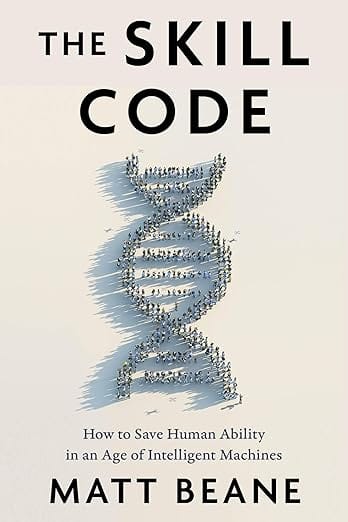Matt Beane's The Skill Code: How to Save Human Ability in an Age of Intelligent Machines is an urgent discussion about the loss of expertise in many fields due to the changing relationship of mentors and apprentices – or experts and novices. The author begins with a broad overview of different fields where this personal connection has been the keystone of growing skills in the next generation, and in helping apprentices become experts. Robotic and AI advances are already threatening these time-tested alliances, and the ramifications threaten to be serious and enduring.
The author gives a broad overview of how experts learned their craft in the past – by interning, apprenticing, and working by the side of more experienced practitioners, who themselves likely learned in the same manner. For someone not attuned to how this works across different industries, it is very interesting to see the commonalities identified that make the mentor-mentee relationship work well across the board. The attributes that lead to skill development can be described as the 3 Cs:
- Complexity - The steps and processes that are non-trivial and often ambiguous
- Challenge - Hard problems – the problems that often require new methods required for success
- Connection - The human connection with more experienced workers – and the ability to connect with them either in person or virtually
These "3 Cs" are central and paramount in training novices to be experts – and all of them are now in decline due to new technologies.
The author shows how this time-tested, globally successful process is being undermined and often completely removed by AI. There are software systems as well as robotic workers that are now intervening in the mentor/apprentice relationship.
A fascinating example is in robotic surgery, where the automation – usually driven by an experienced doctor – is so comprehensive that the interns and less experienced doctors barely have a chance to participate. In the short term, and for the patient, this produces a favorable outcome – less time in surgery, with generally better results. It raises the question, though, of how the less experienced doctors will get that experience if the robot does most of the work. Are we giving up long term benefits (skill training) for short term gains? This is a common and troubling theme in the book – short term gain vs. long term benefit for the worker, and in fact, for all of society.
Interestingly, the examples are not just from high-tech and high-level fields, such as surgery – the author describes how assembly line workers, with training and mentoring, have traditionally been able to rise up to become supervisors or managers. By learning through challenges, complexity, and having that human connection, they can grow and achieve more (and be paid more). They can help problem-solve and learn by doing.
However, when robotic automation joins the assembly line, the workers tend to "babysit" and "feed" the robots – making sure the goods are flowing so the robots can do the hard work (assembly, combining, packaging). Again, this introduction of high-tech automation may make the line more efficient, but it cuts off a growth path for the workers. Workers in these roles tend to stay in these roles and are unable to learn more or rise to a better role with more responsibility and more pay.
That was the first half of the book – a lot of doom and gloom and challenging situations. What I enjoyed about The Skill Code is that the author is on a mission to help remediate this. He discusses several ways in which AI can help bring people up, instead of keeping them down. Additionally, he posits that, looking ahead, AI and emerging technologies actually will be required to help train and give people new skills.
The system and specific guidelines Beane describes are meant to ensure that skill up-leveling becomes a deliberate outcome when we integrate new technology, and that we have to be intentional and conscious of this. To that end, he describes the essential 3 D's: We must Discover approaches that improve skills and help up-level people, Develop those technologies that foster challenge, complexity, and connection, and Deploy those technologies more consciously with skills in mind and improvements as a goal.
One example of this new kind of skill-building is what Beane calls "shadow learning," in which people learn on their own, without a mentor, but often utilize the same kinds of new technologies discussed above. For example, ChatGPT, YouTube, Khan Academy, and others are all AI-powered to provide more personalized, customized, and targeted learning experiences. This shadow learning happens when people realize they aren't getting the practice or learning they need in the traditional ways, so they figure out for themselves how to get trained. This is often done secretively, quietly, or outside of work, but the determination of the learners ensures they fill in those holes – and the AI technologies can be an ally and assistant in this learning. In a very real sense, the former villain becomes the hero.
The author also uses the term “chimeric learning” with the realization that – like the mythical creature formed from parts of different animals – the future of learning and upskilling will take different forms while combining different modalities and technologies. The integration of these skills and technologies, such as virtual or augmented reality, immersive environments, and tools that can adapt to the individual, will help bridge the gap between theory and practice. This kind of learning with many different elements will become the norm, but it will only be possible with strategic planning and advanced tools and software systems, all targeted at individual learning and growth.
Beane shows that with different ways of learning and new paradigms we can continue to upskill people, but not necessarily in the same old ways. We have to become more vested in our own success and use technology to our advantage, instead of just allowing it to deprive us of our skills. It takes a lot of intention and hard work, but identifying the problem and its potential solutions can point us in the right direction.
The Skill Code is a fascinating look at how skills have been honed and grown in the past, and what we need to do in the age of AI to continue to see skill growth and personal advancement for years to come.









